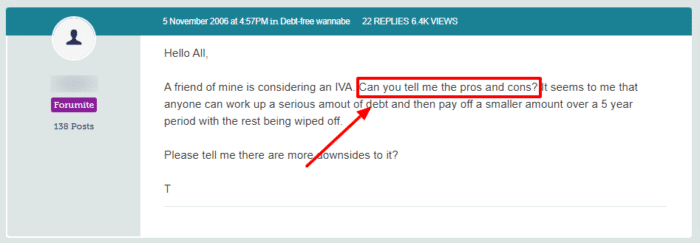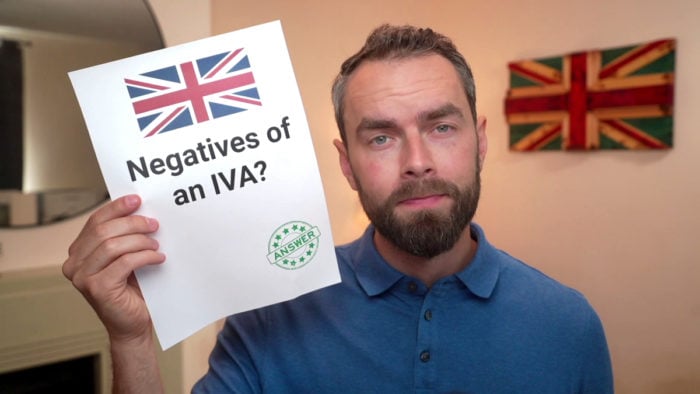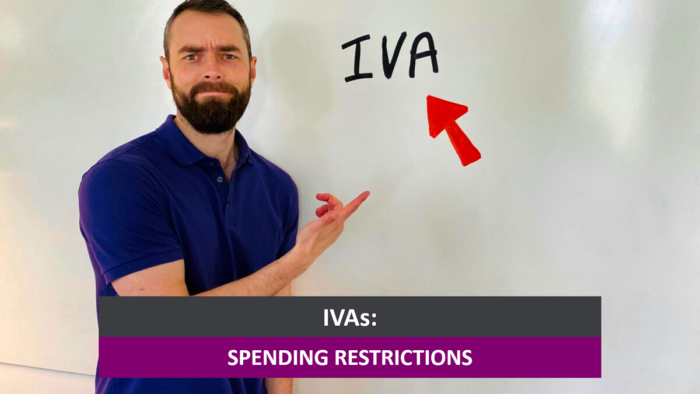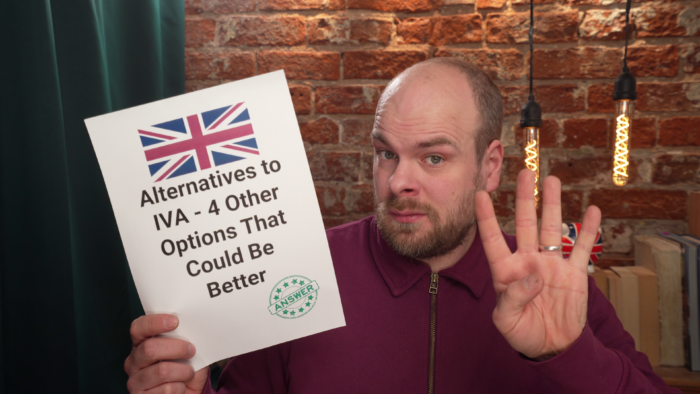Understanding the Individual Voluntary Arrangement (IVA) can seem tricky. If you’re keen to learn more, you’re at the right place.
We realise that the IVA process can be puzzling and the thought of settling debts might be scary. You’re not alone. In fact, over 170,000 people visit our website each month to explore debt solutions.
In this article, we’ll help you understand:
- What an IVA is
- How an IVA can help you manage your debt
- The role of an Insolvency Practitioner
- The potential pros and cons of an IVA
- How an IVA may affect your life
Our team has people who have been in your shoes, dealing with debt and financial worries. We know it can be hard, and we’re here to help you decide if an IVA is worth it for you.
What is an IVA?
An Individual Voluntary Arrangement (IVA) is a debt relief option and a form of insolvency. It’s a formal debt solution, which means it’s a legally binding agreement that you and your creditors cannot get out of – without serious implications.
How does an IVA debt solution work?
To get an IVA set up, creditors that are owed at least 75% of the total amount of money you owe must agree to the IVA proposal. Once agreed, the debtor will make a single monthly payment to their IVA for a fixed period.
Learn more about how the IVA process back on our master IVA page.
How a debt solution could help
Some debt solutions can:
- Stop nasty calls from creditors
- Freeze interest and charges
- Reduce your monthly payments
A few debt solutions can even result in writing off some of your debt.
Here’s an example:
Situation
| Monthly income | £2,504 |
| Monthly expenses | £2,345 |
| Total debt | £32,049 |
Monthly debt repayments
| Before | £587 |
| After | £158 |
£429 reduction in monthly payments
If you want to learn what debt solutions are available to you, click the button below to get started.
What cannot be included in an IVA?
An IVA is used to get out of unsecured debts. You won’t be able to use an IVA to get out of secured loans, mortgage arrears, rent arrears, HMRC debts, student loans, TV licence arrears, child support/maintenance arrears or debts to EU companies.
Get an IVA via an Insolvency Practitioner
The only way to get an IVA approved is by using a licensed professional called an Insolvency Practitioner.
Insolvency practitioners will assess you and your finances to make an IVA proposal during your IVA application. They will charge a fee to set up the IVA and they will take a fee from your ongoing monthly repayments.
Step-by-step Process of getting an IVA
The IVA approval process usually takes around six weeks to complete, and will look something like this:
- If an IVA is deemed appropriate for your personal circumstances, then you will be appointed an Insolvency Practitioner (IP).
- They will then draft a statement of affairs, which essentially is an overview of your current financial circumstances (what you own and where you fall down).
- If you’re happy with the statement of affairs, your IP will then distribute the proposal to your creditors, as well as the local county court and insolvency service.
- There will then be a meeting of creditors where the creditors you owe will choose whether or not to accept or reject your proposal.
- If 75% or more (based on debt value) of the votes are in favour of the proposal, your IVA will be approved.
- When you’re approved, all creditors are informed and your IP will either nominate a supervisor or continue to monitor your monthly payments and ensure you’re sticking to the terms of the IVA.
If you keep up with the payments for the agreed length of time (usually 5 years, but this can be extended) then you will complete your IVA and the remaining debt will be written off.
What does an Insolvency Practitioner do?
Roles of an Insolvency Practitioner is to make sure that taking out an IVA is the right choice for you. If they agree it is, they also help protect you from having to deal with all of your creditors, as well as keep an eye on you during your IVA to make sure everything is going to plan.
What expenses are allowed in an IVA?
Your essential expenses will be considered when using an IVA to determine how much you can afford to pay within monthly payments.
To work out how much you can afford to repay, insolvency practitioners will consider the following as essential expenses:
- Rent or mortgage payments
- Groceries
- Utilities and bills
- Clothing
- Toiletries
- Healthcare
- Essential transport costs
How long does an IVA last?
An IVA is usually fixed for five years but it can be set up for shorter or longer durations.
Moreover, your IVA duration can last longer than first arranged for different reasons, which are discussed in our IVA timescale blog.
» TAKE ACTION NOW: Fill out the short debt form
What happens after 5 years of an IVA?
After you have been paying into your IVA for five years, the IVA will either:
- End and any outstanding debt included within the IVA will be written off
- Be extended for another 12 months
An IVA will only end after five years if you are a homeowner and agree to try to remortgage to release some equity from your home. This cash release will then be used to pay off as much of any remaining debt as possible. Alternatively, you might be able to make a lump sum payment to end the IVA. Any remaining debt will be wiped.
If you’re not a homeowner, you will be asked to make a lump sum payment to clear the debts or extend your IVA for a sixth year. After the sixth year, any outstanding debt will be written off and you will be free from the IVA.
MoneyNerd has created some IVA examples to help you understand what happens after five years.
Can IVA be extended to 7 years?
Although an IVA can be extended for seven years as per the Insolvency Act 1986, a 7-year IVA is exceptionally rare.
How many IVA payments can I miss?
Your IVA could be extended if you miss monthly payments. Most IVA agreements state that the IVA will only fail if three monthly payments are missed within any 12-month period.
But it’s worth checking with your Insolvency Practitioner what will happen if you will miss a payment. The Insolvency Practitioner will be able to give you the exact consequences based on your agreement.
If the IVA fails your creditors could try to make you bankrupt!
What happens to my IVA if I earn more money?
During the course of your IVA, your finances may change. You must communicate any reduction or increase to your income to your IVA supervisor, so they can adjust your IVA monthly payments accordingly.
Therefore, if you start to earn more money you’ll be made to pay more towards the IVA.
What are the pros and cons of IVA?

We’ve discussed the pros and cons of an IVA in detail in our dedicated IVA pros and cons post. Or you can understand the fundamental benefits and drawbacks of an IVA below.
What are the advantages of using an IVA?
- An IVA creates a clear path out of unsecured debt
- An IVA stops creditors from contacting you and taking further action
- An IVA only asks you to make an affordable monthly payment
- An IVA could write off some of your debt at the end of the repayment period
What are the disadvantages of IVA?
- An IVA puts you under spending restrictions
- IVAs are recorded on a public register and will reduce your credit rating
- IVAs cost money to set up and there are ongoing fees
- Homeowners will be asked to remortgage to release equity after five years
For further details on the disadvantages of an IVA, consider reading our Negatives of an IVA blog.
Thousands have already tackled their debt
Every day our partners, The Debt Advice Service, help people find out whether they can lower their repayments and finally tackle or write off some of their debt.

Natasha
I’d recommend this firm to anyone struggling with debt – my mind has been put to rest, all is getting sorted.
Reviews shown are for The Debt Advice Service.
How much does an IVA cost?
There are several different costs associated with entering into an IVA. Specifically, you will need to pay a Nominee fee, a Supervisor fee, and disbursements. The value of these fees will mainly depend on your creditors, your monthly contributions, and any expenses you need to pay to third parties during your IVA.
What does an IVA stop you from doing?
An IVA commits you to pay off your debt with your disposable income. As such, you will be expected to only make purchases that are deemed essential to maintaining a reasonable standard of living. You’ll be under spending restrictions and won’t be able to make any luxury or unnecessary purchases.
An IVA may affect your future in other ways, such as making it difficult to get a loan or mortgage during or in the aftermath of the IVA.
Who will see my IVA?
Your IVA will be recorded on a public insolvency register that can be accessed by anyone. However, the register is predominantly used by credit reference agencies only.
Your family and friends might see your name on the register, and while it’s highly unlikely, it’s understandable that you might be distressed.
You may wish to speak to friends and family in confidence about your situation to help ease these worries, as well as reassure your loved ones that you’re trying to get back on the right track.
Can I go on holiday with an IVA?
There isn’t a rule to say you’re not allowed to go on holiday within an IVA, but spending money on a holiday conflicts with using the IVA to clear debts with disposable income.
Some people do manage a breakaway while on an IVA without issues. If someone else pays for your holiday then this cannot be deemed an issue.
Can I keep my car on an IVA?
You can usually keep your car when entering an IVA providing that the vehicle is used for essential transport, such as getting to work or taking children to school etc.
You might not be able to keep the car if it’s of significant value, but your Insolvency Practitioner will make the final decision.
Will my job be affected by an IVA?
Using an IVA can affect your employment if you work in law or finance. Other jobs aren’t affected by taking out an IVA and you aren’t obligated to tell your employer.
How badly does an IVA affect credit rating?
An IVA will be recorded on your credit file and will significantly damage your credit score. An IVA makes it difficult to get approved for credit during and after the IVA – until your credit score has been improved.
How long does an IVA last on your credit report?
An IVA is recorded on your credit score for six years. It is automatically deleted after six years and you won’t need to do anything.
Do I have to declare an IVA after 6 years?
Lenders might ask if you have ever used an IVA in the past. It’s important to be honest within credit applications, so you should still declare an IVA even if six years have passed.
In the meantime, you can take steps to improve your credit score after you’ve completed your IVA so that if future lenders do ask, they will also see that you’re taking active steps to improve your financial habits:
- Paying direct debits on time
- Sign up for the electoral roll
- Consider taking out bad credit cards to rebuild your credit score. This can be a dangerous option because it can be tempting to spend. However, using it properly can make a significant difference on your credit report.
- Keep an eye on your credit score. You can check for free using ClearScore! Not only that, the company gives you tips on where you’re going wrong and what you’re doing right.
Can I still get credit with an IVA?
It’s extremely difficult to get approved for a loan or mortgage while using an IVA, but it’s not impossible. Any credit you’re offered is likely to be limited and comes with a high-interest rate.
Is an IVA Worth it?
Despite the spending restrictions and other limitations, an IVA can still be worth it.
The IVA can stop your debts from escalating into bigger arrears, create a clear pathway to get out significant debts in a more reasonable timeframe, and it can even write off some debt in the end.
However, everyone’s situation is different and it’s worth considering other debt solutions alongside an IVA.
Can you exit an IVA early?
Yes, it’s possible to exit an IVA agreement early by making a lump sum payment. This might be an option if you have come into some money, possibly through an inheritance.
What happens if I want to cancel my IVA?
If you want to stop your IVA payments your creditors could apply to make you bankrupt.
If you want to stop the IVA because your financial situation has worsened, let your IVA supervisor know and they may be able to reduce your payments to keep them affordable.
Before you make any moves, learn about the other potential outcomes of cancelling your IVA!
Is getting an IVA a good idea?
Getting an IVA can be a very good idea for some people. They can be the most beneficial solution for people with debts that they cannot afford to repay in a reasonable amount of time. However, there are alternatives out there that you should explore before making your final decision.
Is an IVA right for me?
Getting personalised debt advice is the only way to know if an IVA is right for you.
You may be offered debt advice from a commercial debt management company, which can also set up your IVA. However, these companies have a commercial motivation to get you on an IVA, so some people prefer to look for other free debt advice when it comes to establishing, is an IVA worth it.
Get free debt advice now!
Free debt advice on the most suitable debt solutions for you is available through debt charities. You can get confidential and personalised advice on using an IVA or another solution like a DRO by calling today.




